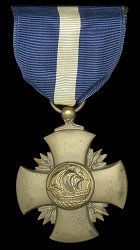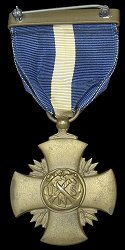|

Houston Marine receives Navy Cross
Submitted by: MCB Camp Pendleton
Story Identification Number: 200456172127
Story by cpl. Luis Agostini

MARINE CORPS BASE CAMP PENDLETON, Calif. (May 6, 2004) -- Marine Pfc. Joseph B. Perez received the Navy Cross Medal from the Commandant of the United States Marine Corps, Gen. Michael W. Hagee, during an awards ceremony Thursday at Marine Corps Air-Ground Training Center, Twentynine Palms, Calif.
Perez, 23, a Houston, Texas, native, received the naval service's second highest award for extraordinary heroism while serving as a rifleman with Company I, 3rd Battalion, 5th Marine Regiment, 1st Marine Division, 1st Marine Expeditionary Force, in support of Operation Iraqi Freedom April 4, 2003. The Medal of Honor is the highest military award.
Three other Marines received medals for valor at the same ceremony.
"They are the reflection of the Marine Corps type who's service to the Marine Corps and country is held above their own safety and lives," said Gen. Hagee, commenting on the four Marines who received medals during the ceremony. "I'm proud to be here awarding the second highest and third highest awards for bravery to these great Marines."
"These four Marines are a reflection of every Marine and sailor in this great battalion," said Sergeant Major of the Marine Corps, Sgt. Maj. John L. Estrada.
1st Platoon came under intense enemy fire while clearing near Route 6 during the advance into Baghdad. Perez, the point man for the lead squad, and therefore the most exposed member of the platoon, came under the majority of these fires.
Without hesitation, he continuously fired his M16A4 rifle to destroy the enemy while calmly directing accurate fires for his squad. He led the charge down a trench destroying the enemy and while closing and under tremendous enemy fire, threw a grenade into a trench that the enemy was occupying.
While under a heavy volume of fire, Perez fired an AT-4 rocket into a machine gun bunker, completely destroying it and killing four enemy personnel. His actions enabled the squad to maneuver safely to the enemy position and seize it.
In an effort to link up with 3rd Platoon on his platoon's left flank, Perez continued to destroy enemy combatants with precision rifle fire. As he worked his way to the left, he was hit by enemy fire, sustaining gunshot wounds to his torso and shoulder.
Despite being seriously injured, Perez directed the squad to take cover and gave the squad accurate fire direction to the enemy that enabled the squad to reorganize and destroy the enemy.
"It is unreal, it is not what I expected, it is unbelievable," Perez said. "This is real weird for me, because, I am not big on special events," said Perez.
In effect since April 1917, and established by an Act of Congress on Feb. 4, 1919, the Navy Cross may be awarded to any person who, while serving with the Navy or Marine Corps, distinguishes himself/herself in action by extraordinary heroism not justifying an award of the Medal of Honor.
The action must take place under one of three circumstances: while engaged in action against an enemy of the United States; while engaged in military operations involving conflict with an opposing foreign force; or, while serving with friendly foreign forces engaged in an armed conflict in which the United States is not a belligerent party. To earn a Navy Cross the act to be commended must be performed in the presence of great danger or at great personal risk and must be performed in such a manner as to render the individual highly conspicuous among others of equal grade, rate, experience, or position of responsibility.
More than 6,000 Navy Crosses have been awarded since World War I. -30-
|
 Marine Pfc. Joseph B. Perez - 23, a Houston, Texas, native, received the naval service's second highest award for extraordinary heroism while serving as a rifleman with Company I, 3rd Battalion, 5th Marine Regiment, 1st Marine Division, 1st Marine Expeditionary Force, in support of Operation Iraqi Freedom April 4, 2003.
Marine Pfc. Joseph B. Perez - 23, a Houston, Texas, native, received the naval service's second highest award for extraordinary heroism while serving as a rifleman with Company I, 3rd Battalion, 5th Marine Regiment, 1st Marine Division, 1st Marine Expeditionary Force, in support of Operation Iraqi Freedom April 4, 2003. 
